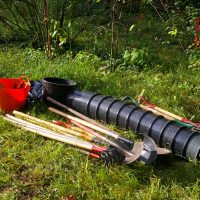January Color Appears at the Washington Park Arboretum (Part II)
Witt Winter Garden
1) Cornus sanguinea ‘Midwinter Fire’ Bloodtwig Dogwood
Young stems of this cultivar are orange-yellow with the sunny side turning carmine red.
Stem color of species is gray to purple, while the color of C.s. ‘Midwinter Fire’ is yellow-green in summer changing to winter colors rapidly at leaf drop in fall.
2) Hamamelis x intermedia ‘Pallida’ Witch Hazel
This hybrid of H.
Read moreMLK Day of Service: UBNA Work Party in Review
On Jan, 19, also known as the MLK Day of Service, a group of 7 volunteers helped remove ivy from cottonwood trees near the Union Bay Natural Area waterfront.
Just along the UBNA loop trail at the waterfront viewing area, many of the cottonwood trees have been suffocated by invasive English ivy. These trees may become a safety hazard for trail-users as ivy foliage weighs down branches.
Michelle Venetucci: Alumni Profile
Farm Alumni Michelle Venetucci double majored in Community, Environment, and Planning (CEP) and Anthropology at the UW, graduating in 2011. During her time here she volunteered at a nascent UW Farm; read about her experience at the Farm during it’s early years and how it impacted her academically and professionally.
How you were involved in the farm?
I was involved with the farm from 2008 – 2011.
January Color Appears at the Washington Park Arboretum
“Piercing, sucking and galling!”
1) Mites (on Sasa Bamboo and Skimmia)
Stippling and yellowing of leaves are often indicative of the presence of mites.
Feed by piercing underside of leaves and sucking chlorophyll out decreasing photosynthesis, reducing plant vigor and compromising the appearance.
Mites are not insects; they are arachnids.
2) Galls (on Willow and Rose)
Abnormal plant growths caused by various organisms (insects, mites, fungi, etc.)
Galls are formed by increased production of normal plant hormones as response to feeding, egg-laying or disease infiltration and are often not harmful to the plant.
Leadership Position Openings 2015
The UW Farm is the student run farm at the University of Washington. With three locations across campus, specialized sustainable agricultural activities, and weekly events, we offer exciting opportunities to the student body and local community to get involved in urban agriculture.
We are in midst of a lot of activity and growth at the Farm, and need to fill several volunteer leadership positions for the 2014-2015 school year and beyond.
When and Why to Cut Leaves Off Epimediums and Hellebores
Busy gardeners appreciate the early spring flowers and minimal care required of evergreen perennials such as epimediums and hellebores. They don’t need dividing or staking or fertilizing, they just do their thing without much gardener intervention. Yet a little attention in late winter will improve the appearance and show off newly emerging flowers.
Roy Farrow, one of the UW Botanic Gardens horticulturists, attends to enormous swaths of epimedium and hellebore in the Washington Park Arboretum’s Witt Winter Garden.
A glimpse into the past – a remarkable issue of the Arboretum Bulletin
By John A. Wott, Director Emeritus. Recently I was given a copy of the Arboretum Bulletin, Volume VIII , no. 4, Winter 1945, by Lyn Sauter, who was the first librarian for the collection of books that became the Miller Library.
Read moreWinter Squash Recipes
During our November potluck, Josh Furman demonstrated how to make all sorts of delicious things with squash, because, well, it’s that time of year. Here are his recipes, as promised:
Roasted Winter Squash Salad
2-3 winter squash sliced
1 onion sliced into wedges
1/2 tablespoon sumac and 1/2 tablespoon nigella seeds (optional)
2 tablespoons sliced almonds or other crushed nuts such as pistachios.
A glimpse into the past – Leissler’s 1934 design for the Arboretum
An historic document connected to the early “life” of the Washington Park Arboretum has been found. It is the (believed) first design for the Arboretum, prepared in 1934 by Frederick Leissler, landscape architect in the Seattle Department of Parks.
Read moreTool rules from a seasoned horticulturist for home gardeners

UW Botanic Gardens Horticulturist Neal Bonham has been gardening at the Washington Park Arboretum for years. When asked if he had any rules for home gardeners for optimal tool use he grew philosophical, “I’m reminded of the anecdote of someone asking a Taoist butcher how often he sharpened his knife. He answered ‘I never sharpen it. I only cut between the joints.'”
Read more